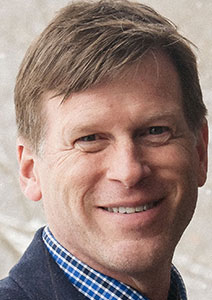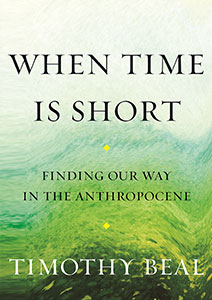Case Western Reserve University religious studies professor, author Timothy Beal’s new book offers ‘palliative hope’ amid climate crisis threatening human extinction
Author and Case Western Reserve University religious studies professor Timothy Beal offers humanity a bit of advice amid what many see as an increasingly dire environmental outlook in his most recent book, When Time is Short: Finding Our Way in the Anthropocene.
“What matters most when time becomes short,” Beal writes, “is always what matters most.”

Beal, Distinguished University Professor and the Florence Harkness Professor of Religion at Case Western Reserve’s College of Arts and Sciences, said he believes that simple aphorism can elicit what he calls a “palliative hope.”
In this case, that hope—borrowing the word from the gentle and intentional end-of-life healthcare practices for a dying person—is applied to all of us. It is Beal’s hard-fought response to the bleak idea that the human race may be hurtling toward the end of its time on earth.
“I don’t want to be a ‘doomer’ about the climate crisis, but I’m also uneasy about the ‘we can do this,’ or ‘ we can beat this thing’ mentality,” he said. “So, as a scholar and a writer, I also like and find it necessary to push and explore hard questions, and these are some of the hardest and a concept that requires pushing through the denial that has brought us to this situation.”
But Beal said he hopes his new book, his 10th on primarily religious topics, also serves as a call to spend what time we have left cultivating and respecting and caring better for others.
Those others include other humans, other creatures and the land, water and sky. In other words, it’s time to start living like we’re dying—in a more nurturing, gentle way—and as mortal creatures, not the planetary overlords we’ve imagined ourselves to be, he advises.

Environmental end of days
Beal said he draws inspiration from the likes of teenage Swedish environmental activist Greta Thunberg and others as “the prophets of our day” regarding climate and species collapse.
He said this new book is his way to “join the conversation about how to shift the narrative” and provide “insight into how we got to this state of denial, how religion has so powerfully inspired, indeed ordained this denial, and also how religion might help us break through it…”
When Time is Short: Finding Our Way in the Anthropocene, published by Beacon Press, goes on sale July 12. (The title references the word coined at the turn of the millennium to “underscore the fact that we are now living in a world in which anthropogenic [human-originating] forces have as much or more impact on the planet’s ecological and geological systems as nonhuman forces do.”)
Human exceptionalism: the religion of the Anthropocene
Beal lays the blame for human hubris that led to the demolition of our climate squarely at the altar of religion, or, rather, on “the theology of human exceptionalism.”
This destructive, extractive mindset stems from a “highly distilled form of modern Western Christian theology, one that is rooted in a tiny handful of Bible verses” (particularly Genesis 1:26) about humanity’s alleged God-given rule over the earth.
He asserts that—even in its secular expression, or maybe especially so—this “theology remains the intractable core faith of global capitalism, the religion of the Anthropocene.”
“This is our theological origin story, the founding myth of the modern West,” he writes. “It is also the unacknowledged, little understood, yet fundamental sustaining faith that fuels global capitalism, whose Anthropocenic dream of infinite growth through extraction is driving and drilling us to an early extinction.”
Finding our ‘Earth creatureliness’
Beal’s response to what he characterizes as a misreading of Biblical texts is to re-connect them to earlier interpretations that don’t compel humans to exert dominion over creation.
Instead, he said, look to other narratives, particularly nature-religions practiced by people such as indigenous Americans and others who have “a spiritual worldview characterized by interdependence and impermanence.”
“Modern Christianity has taken such pains to try to distance its inherited traditions from other ‘primitive’ indigenous religions,” Beal writes. “Rereading these traces of the biblical-aboriginal on the horizon of human finitude, I find that they speak to the cultivation of what I call earth creatureliness.”
That state of mind is marked by a “humble recognition of an intimate relationship between the human and the humus, the earth creature and the earth.”
Beal said he doesn’t “pretend to have anything like a fully formed alternative” to responding to a climate cataclysm, but still believes we need to face the possibility.
“But I do believe that by asking the questions, as honestly and self-reflectively as we can, and by inviting conversation about those questions, we might find some clarity of understanding,” he writes. “Not only about how we got to this latter-day point in human history, but also about where hope now lies—hope not over against grief and loss, but in the face of those realities.”
For more information, contact Mike Scott at mike.scott@case.edu.

